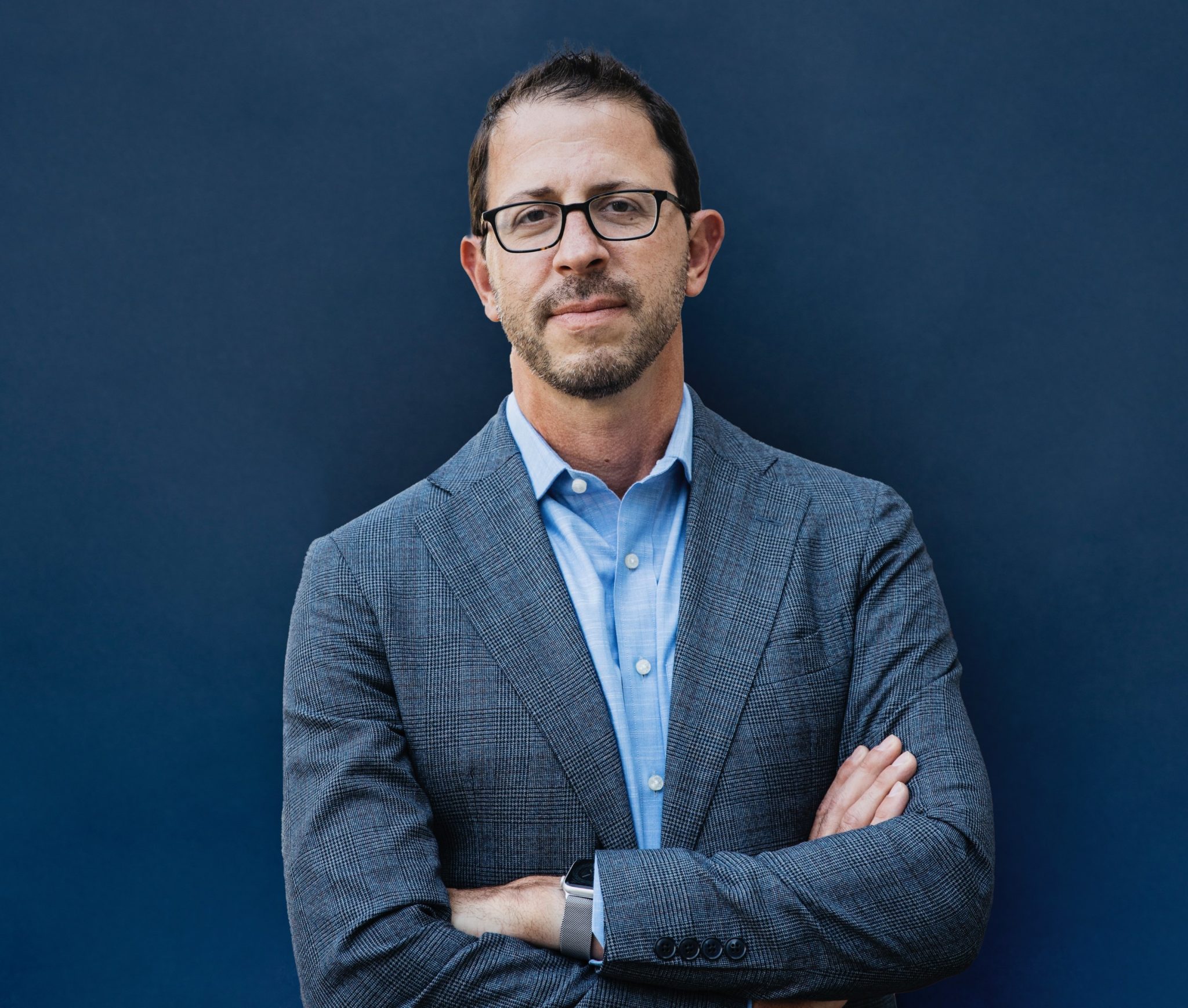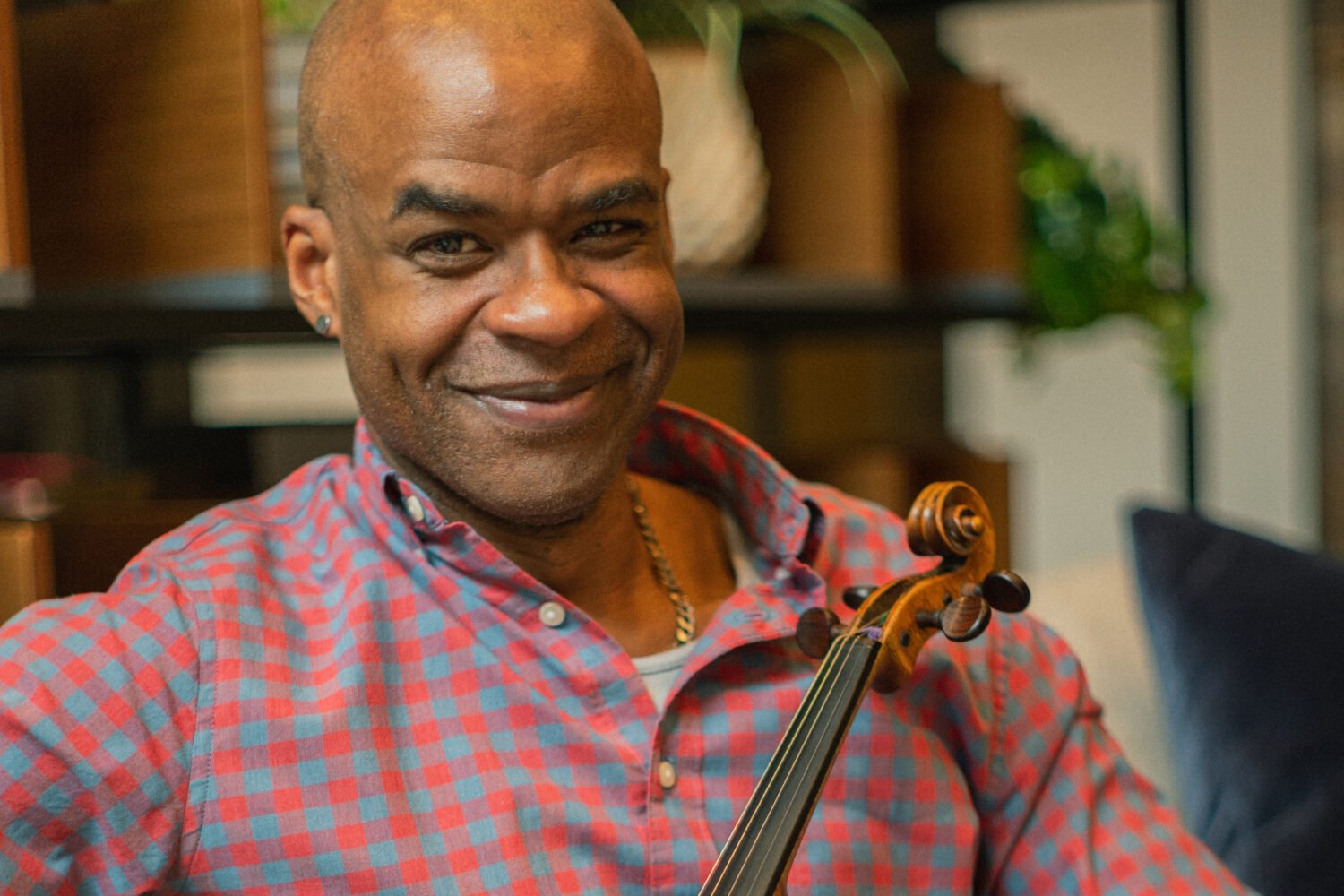Ian Bassin was at home in his kitchen when he received a curious call. A man asked if he was alone, which “really threw me off,” says the lawyer and executive director of Protect Democracy. “That’s such a bizarre thing for someone to ask at the beginning of a call.” But it soon made sense. The stranger had big news to share: Bassin was one of 20 people chosen this year to be MacArthur Fellows—recipients of what’s commonly known as the “genius” grant.
Bassin—whose bipartisan nonprofit fights against authoritarian practices in the United States—will receive a no-strings-attached award worth $800,000 over the next five years to use as he sees fit. An associate White House counsel during the Obama administration, he went on to cofound Protect Democracy in 2016. The organization’s efforts have included filing defamation lawsuits on behalf of people harmed by disinformation and creating a software platform that monitors election integrity. “Democracy is a rare form of government in human history,” Bassin says. “It takes effort to maintain a system that is oftentimes frustrating, slow, imperfect, and hard to navigate. But if you stop investing in it, it will wither.”
I have to be honest with you: It’s pretty intimidating to interview a genius.
Well, let me relieve you of that concern. I now routinely get mocked at my house if I can’t remember when to move the laundry from the washer to the dryer. So “genius”? I’m definitely not. [Laughs.] They overdo it on the branding.
I’ve always wondered if people close to MacArthur Fellows poke fun at them about the genius thing.
Incessantly.
How do you plan to spend the $800,000?
Honestly, at this point, I’m still pinching myself that this is real.
So what was your reaction when you found out?
It was completely shocking. It never would have occurred to me that someone or some organization doing the kind of work we do would even be a candidate. My understanding was that it’s something that gets awarded to scientists or academics or violin players.
Why do you think they chose you?
I understand my selection to be more about MacArthur trying to signal to the public the importance of protecting democracy at this point in time. As the person they singled out, it’s therefore my responsibility to use that light to lift up the importance of what we are doing. I think that was MacArthur’s goal and that’s my job.
“I now routinely get mocked at my house. ‘Genius’? I’m definitely not. They overdo it on the branding.”
Let’s talk about your job, then. You launched Protect Democracy in 2016. I would ask what prompted you to found it, but that year doesn’t strike me as a coincidence.
Part of my responsibilities in the White House Counsel’s Office was making sure officials follow the rules that govern executive-branch behavior. Upon the presidential election in 2016, I immediately began talking with some of my former colleagues about what would happen if we had a President who was not committed to following those rules.
And I think our reason for concern is fairly obvious. [Trump] is somebody who doesn’t believe, fundamentally, in the idea of constitutional representative democracy in this country. He is an autocrat, and we felt people on the left and the right should be able to join together in defending the fundamental institutions of our democracy.
Why is it we’re seeing such a rise in illiberalism right now?
I don’t think anyone knows the definitive answer to that. One possible driver is that Western democracy is not delivering the goods. Over the last several decades, the global poor have seen their income skyrocket as labor markets have globalized, and similarly, the wealthiest 1 percent have also seen their wealth rise dramatically. Meanwhile, the middle class in most advanced democracies has stagnated. So one theory is that the middle class is feeling like it’s the one group being left behind.
A second theory is that we are becoming atomized as a society and it’s very hard for democracy to thrive in that environment. [Some] people correctly blame social media for exacerbating those dynamics: Social media is turning us against one another. The third theory is the backlash to demographic change. Some social-science studies have shown that one of the number-one predictors of support for Donald Trump in the 2016 election was fear of social-status loss among predominantly white, Christian, rural male voters who were used to having outsized hegemonic control over our politics and are now being forced to share that with a diversifying nation.
Historically, we’ve seen authoritarian leaders come from both the far right and the far left. But lately it seems like they’re more often coming from the far right. Is there a reason for that?
It’s true that an authoritarian assault on democracy could come from the right or the left. But today, while there is illiberalism on the far left and the far right, they are asymmetric. The threats we are seeing from the far right are far more prevalent and far more powerful than the illiberal stirrings on the far left. You can see that in the United States, where [only] one of our parties has a diversity of views within it but the dominant power within the party is committed to a constitutional representative democratic government. There can be no question about where the dominant threat is coming from right now. It is coming from the right-wing authoritarian movement in the United States, and that movement has overwhelmingly captured one of our two political parties.
Are you suggesting the Republican Party is intentionally working to weaken our democracy? Maybe I’m too much of an optimist, but it’s hard for me to imagine the entire party is scheming against democracy.
I think it’s really important to separate out Republican voters and conservatives in America from the behavior of the elected leadership of the Republican Party right now. Because there are plenty of conservatives, there are plenty of moderates, there are plenty of progressives, there are plenty of Republicans, and there are plenty of Democrats at the citizen level who are committed to preserving the democratic form of government. But the elected leadership of the Republican Party right now is overwhelmingly behaving in anti-democratic ways, and you don’t need to take my word for it. Look at what political scientists have laid out as the three necessary elements of a healthy party in a democracy: to accept electoral defeat, to eschew violence, and to break with anti-democratic extremist groups. In the last two years, the leadership of the Republican Party has failed at all three of those tasks, so we need to be very clear-eyed about that—while at the same time building a coalition of people on the left, right, and center who will stand together in defense of democracy.
I’m an optimist, too. And I do think we will survive this moment, but the way we will survive it is by uniting people who are committed to preserving the democratic form of government. Historically, that’s what has thwarted authoritarian movements. We saw it just recently in Poland, where the center right united with the left in order to unseat the illiberal nationalist government that has governed Poland for the last several years.
Do you think Republican politicians are just afraid of losing elected office, or do they believe what they’re saying?
There are certainly some true believers among the elected Republican ranks who genuinely believe that we need an American Caesar or that Donald Trump was wrongfully deprived of victory in the 2020 election. Much more common, I think, are elected Republicans who don’t believe either of those things and privately [think] Trump [is] unethical, immoral, corrupt, and an embarrassment. But where there is a failure of imagination is that I don’t think they see him as dangerous. They have an extreme degree of faith that the American system is somehow impervious to a tyrant. What that misunderstands is that the founders always feared that a tyrant could undermine the system. They built a set of checks and balances that are not self-executing but depend on citizens animating them to protect the self-governing structure that the Constitution lays out.
“We will survive this moment by uniting people committed to preserving the democratic form of government.”
I suppose living in the longest continuous democracy in the world can make us complacent.
I do think, in many ways, we are victims of our own success. Democracy is not an intuitive way to run things. We don’t run our businesses as democracies. Most of us don’t run our families as democracies. Democracy is a rare form of government in human history. Hopefully, the crisis we’re currently experiencing will cause us and the rising generation to be reminded of the need to work to maintain democracy—and that what comes out of this moment is that we get a little bit closer to achieving the more perfect democracy we’ve always aspired to.
It reminds me of that quote from Ben Franklin when he was asked if we have a monarchy or a republic. He said something along the lines of “A republic, if we can keep it.”
That’s right. And, you know, in a speech long before he ever became President, Lincoln famously warned us that if the American experiment was ever to fail, it would not be at the hand of a foreign enemy; it would be from within.
Speaking of famous wordsmiths, I’ve noticed that when you’re not tweeting about saving our democracy, you occasionally tweet about David Bowie and Bob Dylan. Have they influenced your thinking much?
I am who I am in large part because of the musicians who spoke to me through my Walkman when I was a kid. My pantheon of gods are David Bowie, Bob Dylan, and Leonard Cohen, and I’ve been thinking a lot recently about a song that Leonard Cohen [released] in 1992 called “Democracy.” There’s a verse in it that goes [something] like this: It’s coming to America first / The cradle of the best and of the worst / It’s here we got the range / And the machinery for change / And it’s here we got the spiritual thirst / It’s here the family’s broken / And it’s here the lonely say / That the heart has got to open / In a fundamental way / Democracy is coming to the USA.
That’s beautiful.
And I’ve been thinking that maybe he’s right. Maybe what we’re going through now is the final passage into the democracy that we’ve never had. We should really lean into that as we think about what sort of spirit we bring into the next year. That’s certainly how I’m trying to approach it.
This article appears in the December 2023 issue of Washingtonian.


















